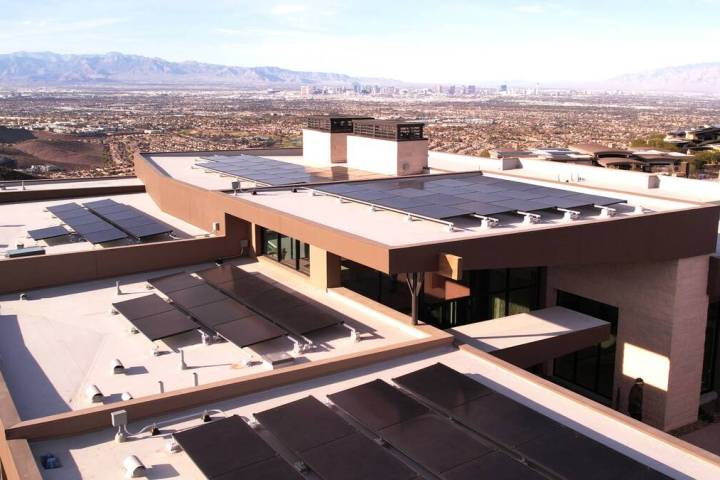Las Vegas home prices continue to rise faster than the national average, but that’s not sustainable and it will take at least six more years and maybe longer to recover values lost during the housing bust, according to research analysts that monitor the Southern Nevada housing market.
S&P Dow Jones Indices released a report showing that home prices have risen 5.7 percent over the past year, higher than the national average of 5.1 percent. That’s continuing a trend of Las Vegas home prices rising between 5.5 percent and 6 percent on an annual basis over the last two years, said David Blitzer, managing director and chairman of the S&P’s index committee.
New York-based S&P uses an index to track the housing market rather than a price and Las Vegas peaked at 234.8 in August 2006. It hit bottom at 89.9 (falling 62 percent) in early 2012, and is at 151 — more than halfway from a full recovery, Blitzer said.
S&P’s CoreLogic Case Shiller Indices are considered one of the best measurements for the Las Vegas housing market because it tracks individual homes over time.
In its report, HSH, a New Jersey-based research firm that tracks mortgages, said Las Vegas has recovered the least of any market in the country and needs to gain another 44.5 percent to recover fully. HSH Vice President Keith Gumbinger said that percentage dropped from 50 percent in the first quarter, which shows a hastening recovery. It uses the Federal Housing Finance Agency’s (FHFA) Home Price Index to track the market — an index that doesn’t include jumbo loans or sub-prime mortgages.
The Greater Las Vegas Association of Realtors reported the median sales price for a home in July was $236,000, up from a bottom-of-the-market of $118,000 after the recession. That’s 33 percent below the peak of $315,000 in 2006.
“Home prices are still rising at a pretty good clip,” Blitzer said. “It’s certainly not fully recovered compared to its all-time peak in 2006 but it had one of the biggest run-ups of any city so the fact it’s not gotten back to that level is not much of a surprise.”
S&P said Las Vegas home prices in the past year rose more than Los Angeles, Phoenix, Chicago, New York and Washington, D.C., among some of the major markets. It lagged just behind San Francisco and San Diego where prices rose just over 6 percent in the last year. Portland led the way at 12.6 percent followed by Seattle at 11 percent. Denver was third at 9.2 percent.
Las Vegas home prices should continue to rise, but the rate is likely to slow down — a pattern seen in other cities in recent months, Blitzer said. The price gains the market has undergone aren’t sustainable, he said.
“If home prices keep going up at 5.5 to 6 percent year after year after year, you’re going to price people out of the market because the inflation rate is under 2 percent,” Blitzer said. “Las Vegas home prices are rising three times faster than the inflation rate and probably two or three times faster than wages are going up. You have to get a lot of people moving to Las Vegas to keep those home prices rising at this kind of pace.”
Core Logic, a property analytics firm, reported earlier this summer that negative equity in the Las Vegas home market fell to just under 20 percent for the first time since the housing crisis. Las Vegas’ peak in negative equity — homeowners owning more on mortgages than the homes are worth — hit 77.6 percent in early 2010.
“Giving that Las Vegas was one of the centers of attention, there’s no surprise in that scenario of a lot of people under water,” Blitzer said. “If the appreciation kept at 5 percent, you can get there in six years. I would expect it would be longer than six years (to recover fully). It could be eight to nine years, but that would be a guess.”
The decline from the peak of the boom to the fall was so steep that it left an “enormous gap” for Las Vegas to try and recover,” Gumbinger said.
“For the most part, Las Vegas has the largest amount of ground yet to cover to get to where home prices were back to peak levels,” Gumbinger said. “That’s not to say there hasn’t already been an impressive recovery in home values there. There absolutely has been.”
Job and population growth will determine how quickly Las Vegas recovers, Gumbinger said. Given where the economy is and current pace of the housing market, it could take as long as a decade for the housing market to fully recover its losses, said Gumbinger, who was more pessimistic than other analysts.
“The prices are coming up and helping to fill that gap, and that’s a good thing,” Gumbinger said. “If the pattern continues at this pace and going forward in the future, it’s realistic that within a decade it will be pretty much solved.”
Other analysts are rosier about the Las Vegas housing market recovery than they were in the aftermath of predictions after the Great Recession. In 2011, Moody’s Analytics said Las Vegas homeowners would have to wait until 2020 to get back half of their values and until 2030 to get all of it back.
The most optimistic about the Las Vegas recovery is Daren Blomquist, senior vice president with ATTOM Data Solutions, which tracks the housing market. He said the most recent median sales price of homes recorded by the company was $209,500, below the peak of $293,930 in June 2006.
The Las Vegas housing market has been bolstered by double-digit price increases early in the recovery, and Blomquist said his form tracks the most recent year-over-year increase at 7 percent. That’s likely to slow down at some point, he added.
Historically, over the last 15 years including the boom and bust, the Las Vegas housing market has appreciated at 5 percent a year, Blomquist said. If that continues, the housing market would fully recover its prices within six years and fewer years with higher annual gains.
“The wildcard is if we had another shock to the housing market or the economy, it could be longer,” Blomquist said.






